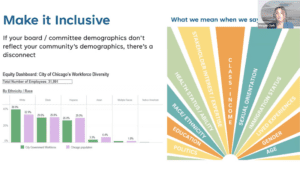Who is a member?
Our members are the local governments of Massachusetts and their elected and appointed leadership.

At the MSA’s annual fall program webinar on Sept. 17, communications experts from the Collins Center for Public Management at UMass Boston discussed building stronger communities through civic participation.
At the Massachusetts Select Board Association’s annual fall program webinar on Sept. 19, communications experts from the Collins Center for Public Management at UMass Boston discussed the roles of select board members in building stronger communities through civic participation.
Morgan Clark, public services manager at the center, said cities and towns sometimes “struggle to mobilize community members to actively participate in local government” through volunteer board and committee positions.
Town boards and committees must often compete with other non-government volunteer opportunities. Additionally, prospective volunteers must overcome participation barriers such as time constraints, child care needs, accessibility and level of expertise.
Clark and Kelsey Edmond, a management analyst at the Collins Center, shared five recommendations, including making the goals of civic participation clear and making the volunteer experience meaningful.
By framing the goals of a board or committee “in a way that a lay person can understand,” Edmond said, select boards can help to reduce intimidation and demystify municipal operations.
Recruitment efforts may also benefit from an issue-based approach, Edmond said. For example, positions on a town Zoning Board of Appeals could be promoted as exciting volunteer opportunities for community members who are passionate about housing or local economic development.
“When the focus of the opportunity is on this issue itself, it taps into prospective volunteers’ personal values,” Edmond said.
Municipal volunteers should be recognized for making a meaningful difference in their communities, Clark said. Volunteer picnics, awards, perks, and other appreciation initiatives help to “strengthen loyalty and boost morale.”
During the Q&A portion of the webinar, Clark and Edmond shared advice for communities with smaller budgets for communication and recruitment, advising select board members to engage with prospective municipal volunteers “on a one-on-one level.”
As elected community leaders, select board members are uniquely positioned to develop a “strong understanding of volunteer concerns and motivations,” Clark said.
“You have the buy-in of your town’s people,” she said.
• Building Stronger Communities Through Civic Participation presentation (7M PDF)